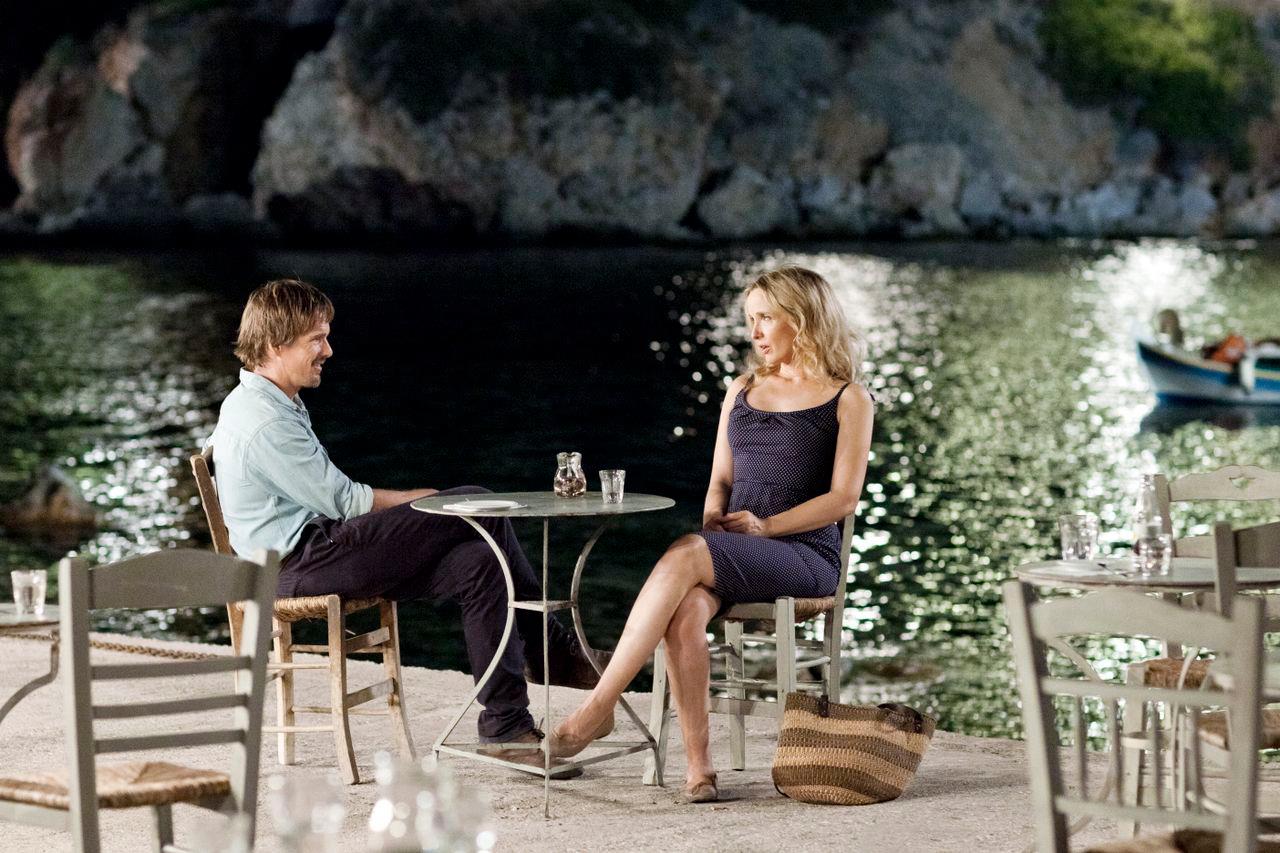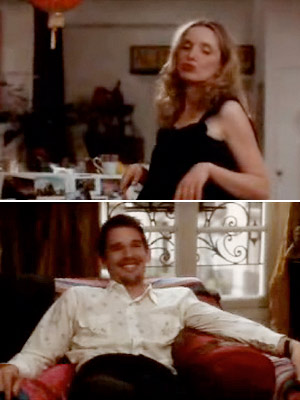 I first saw Scenes From a Marriage, Ingmar Bergman’s 1973 Swedish TV series, at the apartment of a man I’d been considering sleeping with for a while. He’d projected it against a wall painted white expressly for our screening, and we sat through about 45 minutes before he shut it off and turned to me. “This is not sexy,” he said flatly, and we promptly fell upon each other like wild dogs. The affair lasted four months, the precise length of time you can date someone before it deepens into something more serious. I wasn’t surprised. We’d consummated the relationship in the long shadow of a film that denied us any shared illusions about love before experience could do that for us.
I first saw Scenes From a Marriage, Ingmar Bergman’s 1973 Swedish TV series, at the apartment of a man I’d been considering sleeping with for a while. He’d projected it against a wall painted white expressly for our screening, and we sat through about 45 minutes before he shut it off and turned to me. “This is not sexy,” he said flatly, and we promptly fell upon each other like wild dogs. The affair lasted four months, the precise length of time you can date someone before it deepens into something more serious. I wasn’t surprised. We’d consummated the relationship in the long shadow of a film that denied us any shared illusions about love before experience could do that for us.
Before Midnight, Richard Linklater’s third film about the romance of Celine (Julie Delpy) and Jesse (Ethan Hawke) (not counting the couple’s cameo in the director’s animated Waking Life), is the first in this series that smacks of Bergman—that Bergman, in particular. That’s a big old blast of relationship reality. And no matter how well-rendered, it isn’t the movie magic we clamor for even when it’s what we need. I’m not convinced we ever do.
Before Sunrise (1995) began as Celine, a French university student, and Jesse, an American wandering on a Eurorail pass, met cute as strangers on a train. After a bit of banter, the two jumped off in Vienna, reveling in their connection as they chattered on prettily cobbled streets. That film took visual and narrative cues from its 20something stars—magnetic and effusively philosophical—and left us to moon about the road that might stretch before them. Would they regret it if they did not reunite a year later? Would they regret it if they did? It was a perfectly earnest romance for a generation that didn’t earnestly care about anything, and I floated in its reverie for months. Somewhat improbably, it also spawned a terrific franchise (a subversion of the term, yes) built upon all that chattiness: Celine and Jesse were such well-developed characters that they could reanimate without stumbling like scary zombies.
Before Sunset (2004) found them leaner and more resigned, the elapsing nine years having stripped them of more than just baby fat. Jesse was now an unhappily married father on his first international book tour; she, a single-ish environmental activist who was disillusioned both professionally and romantically, at least partly because their reunion never took place. After she surprised him at a Parisian reading of his work, the two took a walk and, along the way, slowly, slightly sadly made their way back to each other. Though the two never actually had sex in this film, it’s far sexier than its predecessor. Because they had already been disappointed by love, life, and each other, their chemistry was more informed, more dangerous and, by the transitive property of sexual attraction, more magical. As the film drew to a close, she was singing Nina Simone as Nina Simone, and he was about to miss his plane back to New York. A perfectly earnest romance about a generation that no longer could afford not to earnestly care about something. I cried in grateful recognition that true connection was still possible, even between a film and myself.
Before Midnight is the first in this series that didn’t make me cry. It is also the first that focuses upon a relationship that not only has had time to bloom but to wither on the vine. It opens at a Greek airport as Jesse, now 41, is bidding goodbye to his son about to return home to New York, where he lives with his mother. The teenager is sweetly patient with his distraught father but also removed: a good kid acquainted with his parents’ failings long before he should have been.
Wrecked, Jesse wobbles outside where Celine, jabbering into a cell phone, waves. They climb into their car, and, while their two golden-haired daughters sleep like tiny Celines in the backseat, begin to talk. Since we’ve just witnessed Jesse’s heartbreak, it’s a shock that the conversation begins with Celine telling him about a new job offer. Enter the sometimes brutal, if necessary, indifference required to sustain daily life in a long-term romance.
For this time Celine and Jesse have been together in the nine years that have passed. We learn that he not only stayed that night but that she then followed him to New York, where they remained until they moved to Paris to raise their twins. Her personal freedom and his relationship with his son have been subsequent casualties: Jesse’s bitter ex-wife has limited his custody; Celene has been forced into the practical parent role as he’s pursued his more high-profile career.
At first, we bask in the glamorous familiarity the two finally have had a chance to develop. She’s still beautifully disappointed, he’s still beautifully feral, and it seems age has burnished rather than dissipated them though neither are automatically show-stopping anymore. He steals his napping daughter’s apple; she complains and jokes in an unvarying tone of easy flirtatiousness. But the conversation turns a corner when he begins to explore the possibility of moving back to the US. A light quarrel escalates. Is he just longing for his son or also trying to leave her? Is her distrust valid or is she overreacting? Their jaws tighten, and they drive on, conspicuously passing ancient ruins they’d been planning to visit.
This is the family’s last night at the literary lion’s home where they’ve spent the summer, and their friends host a farewell dinner that feels lifted right out of a French film, a mostly good one. Sun-dappled and wine-drenched, the group grows more garrulous as they dig deeper in their cups. Philosophy mingles with the personal and Linklater’s camera swoops in and out of various conversations, lingering on half-empty glasses glinting in the day’s last light. It’s idyllic, this meal, a scene you can imagine both Celine and Jesse craved before they came together–except that the actual conversations taking place are the first in this series that feel rote rather than revelatory. It’s ye olde “men are like this/ women are like that” dance. A hackneyed binary that the Celine of the last two films would have mocked rather than perpetuated. Sure, she’s been held hostage by this particular binary ever since she gave birth, and she’s furious about it. But the machinery ratcheting up the drama between the two long-term lovers is another unhappy first for the series: baby’s first clunky plot device. Goo.
 What has always distinguished the Befores has been its quality of dialogue, though, and, binaries aside, that’s mostly intact here. With these lovers, everything isn’t about sex so much as sex is about everything else you can talk about, and even in this film Celene and Jesse’s conversation keeps us vigorously on our toes. But if Celine and Jesse always burrowed into truth so headily that I couldn’t help falling in love right along with them, now I can’t help but fall out of love right along with them as well. At the very least their revelations seem less revelatory. The two have had time to develop a history and, with it, long-brewing resentments that are so universal (“he’s checked out/ she’s crazy”; “he’s useless/she’s demanding”) that you begin to wonder if unhappy families are all alike, even in the movies. By the time they explode at each other on a rare romantic outing, part of us wants out as much as they do.
What has always distinguished the Befores has been its quality of dialogue, though, and, binaries aside, that’s mostly intact here. With these lovers, everything isn’t about sex so much as sex is about everything else you can talk about, and even in this film Celene and Jesse’s conversation keeps us vigorously on our toes. But if Celine and Jesse always burrowed into truth so headily that I couldn’t help falling in love right along with them, now I can’t help but fall out of love right along with them as well. At the very least their revelations seem less revelatory. The two have had time to develop a history and, with it, long-brewing resentments that are so universal (“he’s checked out/ she’s crazy”; “he’s useless/she’s demanding”) that you begin to wonder if unhappy families are all alike, even in the movies. By the time they explode at each other on a rare romantic outing, part of us wants out as much as they do.
Make no mistake: the weakest film in this series is still head and shoulders above most offerings that come down the pike. It looks great—why don’t Linklater’s other films ever look so good?—and I’ll gladly keep visiting with Celine and Jesse until they’re poking at each other with canes. But while Before Sunrise and Sunset may have tiptoed to the precipice of real life, they then granted us that ultimate movie magic: a little hope. Before Midnight suggests that just staying together requires all the magic that a movie about long-term relationships can muster. And that’s not very magical.
Postscript
As we left this critics’ screening, a colleague looked at my impassive features and grinned. “You need to be married to get it,” he said. “Please,” I said. “It’s because I get it that I never got married.”
The irony is that, until now, this series could tease the romantic grinchiness out of even the likes of me. All Before Midnight offers is a cold shower of tough love. Co-writers Delpy, Hawke and Linklater seem to be implying that long-term unions rely upon a folie à deux: mutually (if tacitly) agreed-upon bullshit. Until now this series has offered a different sort of folie à deux: a rose-colored lens that cajoled us into surrendering our cynicism about love. Midnight merely reflects our shit back to us, and the only thing it asks us to surrender is our attachment to movie magic. Which makes me conclude, by the transitive property of folie à deux, that the unilaterally rosy response to this film has entailed a sort of folie a million. Isn’t it romantic?
